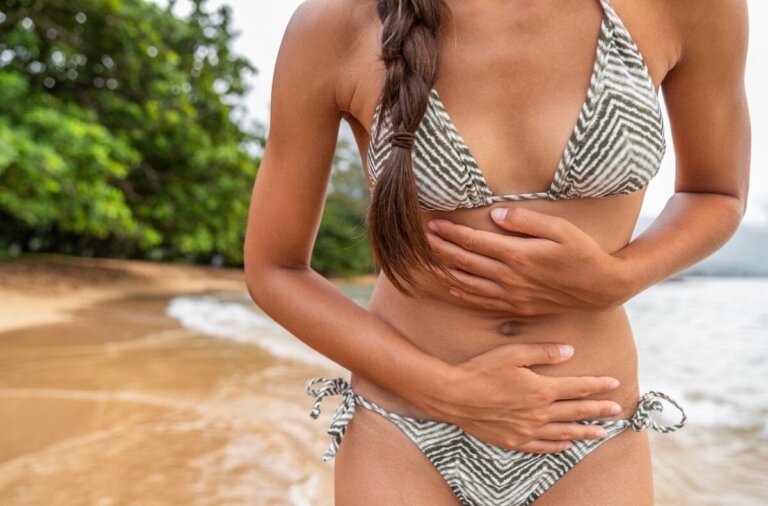7 Tips for Going to the Beach During Your Period


Reviewed and approved by the doctor Diego Pereira
With the arrival of summer vacation, one of the most common favorite plans is to go to the beach. However, if the days of rest coincide with the days of the menstrual period, many feel uncomfortable and begin to consider the idea of suspending that visit. What to do about it? Here are some tips.
First of all, it’s important to remember that menstruation is a natural process that does not have to prevent you from enjoying your free time. As long as you take some self-care measures, you can have a good time without any discomfort. We’ll tell you how in this article.
Can you go to the beach during your menstrual period?
The short answer to this question is yes.
There are no medical contraindications for going to the beach during your menstrual period. Whether or not to do so depends largely on one’s personal preferences.
However, this is also subject to the symptoms experienced on those days. If there are cramps, headaches, and discomfort, it’s best to wait until they improve. The sun and the beach environment can worsen this type of discomfort.
On the other hand, it’s worth making some adjustments in the way you deal with the days of your period. It may be necessary to change the method of protection, in addition to organizing some implements to ensure greater comfort in these environments.
Also, keep track of the flow to make the respective changes when the time is right. This is the best way to prevent accidents due to spills.
Some fun facts you should know…
- Did you know that it’s a myth that menstrual periods are cut off by being underwater? In water, the blood vessels constrict and slow down the flow a bit; however, they don’t cut it off or cause a problem.
- Swimming is a way to calm menstrual cramps and the stress of these days. Its practice favors the release of endorphins (pain moderators) and helps inhibit prostaglandins (responsible for cramps and inflammation).
We think you may also enjoy reading this article: Did You Know a Woman’s Voice Changes During the Menstrual Cycle?
What to do to enjoy the beach during your menstrual period
After understanding that menstruation doesn’t prevent the possibility of swimming or going to the beach, it’s necessary to follow some tips to make the experience as comfortable as possible.
1. Choose the right protection
The comfort and safety provided by the chosen method of protection is the most important thing. In that sense, the two viable options for swimming are tampons and menstrual cups. Each fulfills the function with different characteristics, but they confer sufficient guarantees.
After having the protection, the ideal way to proceed is with some prior practice on the operation of each, this includes the placement along with the required maintenance intervals.
Pads, although for many are the most comfortable option, aren’t recommended for environments such as the beach, as they prevent comfortable enjoyment of water activities and can cause irritation due to heat and humidity.
2. Reinforce your sun protection
During the days of the menstrual period, the skin tends to become more sensitive than normal. Therefore, when exposed to the sun, the risk of sunburn is even greater. To avoid this, broad-spectrum sunscreen (greater than 30 SPF) should be available.
This product should be reapplied at least every two hours. In addition, its use can be reinforced by choosing clothing that helps to cover a large part of the body. Hats and sunglasses complement this extra protection.
3. Make sure you have everything you need
Those who have gone through complicated moments during an outing while having their menstrual period know that it’s necessary to be prepared for the worst. In this sense, it’s convenient to have extra tampons, wipes, soap, pads, and other toiletries.
4. If you shave or wax, try to do this before your period
It isn’t a good idea to leave depilation to the last minute, since the sensitivity of the skin on those days can lead to irritation and discomfort. Therefore, it’s best to wax a few days before your period.
5. Choose an appropriate swimsuit
The confidence generated by the swimsuit will facilitate the choice. Beyond being a model of aesthetic preference, dark colors can help mitigate any emergency situation that may arise. Also, one-piece models show great acceptance during these stages.
6. Stay well-hydrated
Another habit that should not be overlooked when visiting the beach during the menstrual period is hydration. While it’s already necessary to drink water, tea, or any other refreshing beverage under normal conditions, being at the beach or in the pool dehydration is accelerated, which can worsen cramps and bloating.
Make sure you have both bottles of water and electrolyte drinks on hand. Make sure to keep drinking at least every 30 minutes.
7. Keep active
You may want to spend some time at the seashore or lying on the beach. However, there’s no impediment to doing other activities such as swimming, walking, or playing a beach sport.
These types of activities distract you, decrease the feeling of stress, and can contribute to the relief of pain and swelling.
Like this article? You may also like to read: The Menstrual Disc: What Is It and How Does It Differ from the Menstrual Cup?
Menstrual cups: The best option for protection at the beach during your period
Both tampons and menstrual cups are reliable options for being comfortable at the beach during period days. However, of these options, the cup stands out above traditional tampons. The reasons? Let’s take a look:
- It doesn’t work by absorption. Contrary to tampons, the menstrual cup retains until it’s cleaned, so it’s not contaminated.
- Precise adaptation. It molds perfectly to the female body because it’s flexible.
- Easy to use. Both insertion and cleaning with the opening of the plastic handle make it easy and quick to use.
- Ecological option. Since it’s reusable, it doesn’t promote an exaggerated production that harms the environment from non-renewable resources.
- Comfortable. A correct adjustment makes it imperceptible.
- Large capacity. The absorption capacity of tampons is reduced with an approximate duration of 4 or 5 hours, while the menstrual cup can last up to 8 hours without risk of leakage.
What to remember about going to the beach during your period
If the days of your menstrual period coincide with a visit to the beach, there is no reason to cancel your plans. It’s enough to choose the right protection method, as well as to reinforce the measures to expose yourself to the sun. The bleeding itself should never prevent you from enjoying outdoor or water activities.
All cited sources were thoroughly reviewed by our team to ensure their quality, reliability, currency, and validity. The bibliography of this article was considered reliable and of academic or scientific accuracy.
- Kalantaridou S, Makrigiannakis A, Zoumakis E y Chrousos G. Estrés y sistema reproductor femenino. Revista de inmunología reproductiva. 2004.
- Fenster L, Waller K, Chen J, Hubbard A, Windham G, Elkin E y Swan S. Estrés psicológico en el lugar de trabajo y función menstrual. American Journal of Epidemiology. 1999.
- Wang L, Wang X, Wang W, Chen C, Ronnennberg A, Guang W y Xu X. Estrés y dismenorrea: un estudio prospectivo basado en la población. Medicina ambiental y ocupacional. 2004.
- Prado M, Doncel W, Mosquera O y Guarnizo T. La copa menstrual, una alternativa de higiene femenina. Revisión de la literatura. Rev. chil. obstet. ginecol. 2020. Disponible en: http://dx.doi.org/10.4067/S0717-75262020000100099.
- Caballero A. La copa menstrual: un nuevo método de higiene femenina. Hojas de El Bosque. 2016. Disponible en: https://es.scribd.com/document/378219481/La-Copa-Menstrual.
This text is provided for informational purposes only and does not replace consultation with a professional. If in doubt, consult your specialist.








